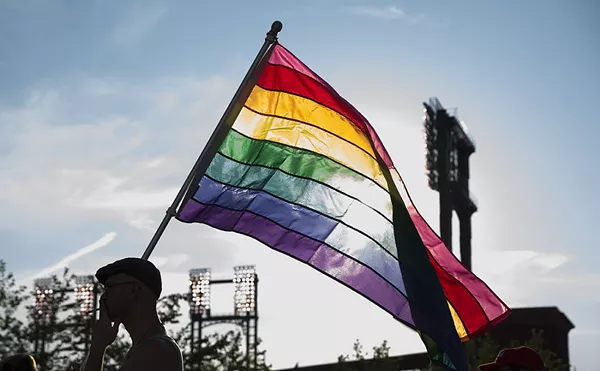Once a poor, proud, stable and peaceful tribal kingdom, Afghanistan has become a chaotic incubator for terrorism. At a recent U.S. Senate subcommittee hearing, Sen. Sam Brownback (R-Kan.) admitted that the U.S. made a big mistake by first manipulating, then ignoring, conditions in Afghanistan: "Now, with the center of terrorism locating in Afghanistan and surrounding regions ... we do not any longer have that luxury."
The Hon. Peter Tomsen, who served as special envoy to Afghanistan from 1989-92, also testified, and in a phone interview with The Riverfront Times, he criticizes the U.S.'s "single-minded 'Get bin Laden' approach," calling it "policeman foreign policy" and adding that "the Taliban will never hand over Osama -- which is another stupid part of our policy: 'negotiating' with the Taliban."
U.S. Rep. Dana Rohrabacher (R-Calif.) goes further, accusing the U.S. State Department of covertly backing the early Taliban because it seemed a lesser threat than communism: "So what we hear today about terrorism and crocodile tears from this administration, let us remember this administration is responsible for the Taliban," he said July 12 in a Capitol Hill hearing. "This administration has acted in a way that has kept the Taliban in power."
Barikzy says quietly, "I know Americans have lots of sympathy for the world, but sometimes the politicians make mistakes that allow human rights to be violated. Because of taking opposite sides with communism, America caused the Islamic movement to have more strength, to raise up more fundamentalism and more terrorism for the world.
"The other mistake," he continues, "is supporting the Pakistani government. The most dangerous government for the peace of the world is Pakistan. Pakistan has double faces -- one democratic, the other very dark. With the democratic face it is loving to the Western countries and gains a lot of assistance. With the dark face it is working against Western countries, teaching jihad."
Barikzy blames Pakistan's Interservices Intelligence Directorate (ISI) for fanning conflict among tribal minorities and blames Pakistani mullahs for encouraging Afghans at the border to grow opium poppies instead of wheat. Such accusations have plagued Pakistan for years. There are many independent reports of soldiers in the Afghan conflict speaking Urdu (the language of Pakistan), and Pakistan is the only nation that still maintains an embassy in Kabul.
Pakistan's embassy in Washington, D.C., did not return calls from The Riverfront Times to address allegations against the ISI. But the U.S. State Department -- which is only now admitting its own role in arming and encouraging Afghani bloodshed -- isn't yet prepared to vilify Pakistan for the "ambivalence" of its policies. Ambassador Michael Sheehan, coordinator for counterterrorism, calls Pakistan "a longtime friend and ally, albeit one that bears some responsibility for the current growth of terrorism." (July 12 testimony to the House International Relations Committee.)
Pakistan has its own national-security interests in Afghanistan, of course, and there is religious affinity between the two nations; formed as an Islamic state, Pakistan's very name means "a pure, clean place," and many who wield power in the current military government are radical fundamentalists. But there's also an older, cruder reason for complicity: land. In 1893, the British and Russians came up with the Durand Treaty, creating a buffer between their empires by sectioning off the Afghan tribal area bordering what is now Pakistan. The treaty was to expire in 100 years. "In 1947, the Afghans said, 'The British have left, and we won't recognize this line anymore, because now Pakistan is there,'" explains Tomsen. "Afghanistan has never accepted the Durand Line. Now, since Islam knows no borders, Pakistan is trying to get the Taliban to recognize the Durand boundary. If that line is challenged, you challenge the territorial integrity of Pakistan."





